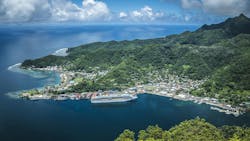U.S. EPA proposes settlements with companies in American Samoa over alleged Clean Water Act violations
The U.S. Environmental Protection Agency (EPA) has announced proposed settlement agreements with Paramount Builders, Inc. and Continental Transport Corporation over Clean Water Act violations on Tutuila Island, American Samoa.
Under the proposed agreements the companies would pay a combined $76,000 for illegal discharges into the Nu’uuli and Tula coastal waters, and Amaile Stream.
In 2022, Paramount Builders began construction on an access road rehabilitation project along Route 008 in Tula.
The project worked to fortify the road from shoreline erosion. Paramount Builders used mechanized equipment to place rock, soil and concrete tri-bar along 2,600 feet of coastal waters in Tula, leading to violations of the Clean Water Act.
In 2023, Paramount Builders completed the Amaile Steam Flood Control project to channelize approximately 300 feet of a natural stream.
As part of this project, Paramount Builders used heavy equipment to excavate, haul and spread fill material into the stream and used concrete to reinforce the streambed and banks in violation of the Clean Water Act. The Amaile Stream flows into the Nu’uuli coast.
Under the proposed settlement, Paramount Builders would pay a $50,000 fine for these violations of federal environmental law.
In late 2022, Continental Transport began construction on the Nu’uuli Village Road Shoreline Revetment Project along the eastern shoreline of Coconut Point. The project aimed to fortify the road from shoreline erosion.
Continental Transport Corporation used mechanized equipment to place rock, soil and concrete tri-bar along 330 feet of coastal waters, leading to violations of the Clean Water Act.
Under the proposed settlement, Continental Transport would pay a $26,000 fine.
Paramount and Continental each worked for the American Samoa Government, Department of Public Works (ASDWP) for these projects, and all three entities failed to obtain the required Clean Water Act permits to do the work.
In October 2023, EPA entered into an Administrative Order on Consent with ASDPW to resolve its liability in relation to these placements.
Under the Administrative Order, ASDPW is required to conduct an inventory and screening process for its aquatic resources to ensure its future earth-moving projects have the appropriate Clean Water Act permits.
According to the EPA, impacts from the illegal placements to protected coral species may include physical damage to corals, sedimentation and turbidity in the water, chemical contamination from equipment, introduction of invasive species on equipment, and noise impacts to fish who feed in the coral habitat.
